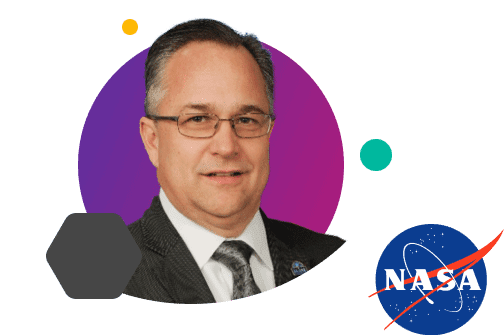
The finalists for WashingtonExec’s Pinnacle Awards were announced Oct. 13, and we’ll be highlighting some of them until the event takes place virtually Dec. 8.
Next is Space Government Executive of the Year finalist Ron Thompson, who’s chief data officer and deputy digital transformation officer at NASA. Here, he talks career turning points, key achievements, proud career moments and more.
What key achievements did you have in 2020/2021?
Since stepping into my role at NASA, I’ve prioritized technology transformation, highlighting three priority areas: work, the workforce and the workplace. These three tiers are crucial to delivering our mission.
My team and I are always looking to seamlessly integrate the employee experience to energize people and ensure employees feel connected through the enterprise. A significant tenet of changing the culture is recognizing that teams work better together vs. alone, and the synergy around collaboration is critical to moving forward as an agency.
As for the workplace, I am focused on creating a flexible, adaptable cyber work environment that is as effective and efficient as possible.
Outside of NASA, I serve on the Federal Chief Data Officer Council, helping to lead the transformation of government processes as operations pivoted at the onset of the pandemic. Data played a vital role. For example, we leveraged data to define COVID-19 cases, identify the number of beds in a hospital and better understand data-sharing across agencies. I led the charge to ensure data was at the center of the decision-making process.
What has made you successful in your current role?
I’ve been successful in my current role by bringing confidence in all decisions that I make. Whether through the business side of NASA — engineering, systems, etc. — or in the transformational side, I’m always seeking to understand outcomes and how they will propel our mission.
By pushing the boundaries and staying confident in my choices and ideas, I’ve been able to move an otherwise risk-averse agency to look at problems from a different perspective. As a result, we’re transforming practices in unique ways, keeping data at the core.
Having confidence in navigating these choices pushes the agency to get knowledgeable on the topics and continue to grow.
I’m always looking for ways to improve systems, make smarter decisions and more uniquely position the agency for success. Entering these difficult conversations with passion will help push change initiatives and missions.
What was a turning point or inflection point in your career?
Early in my career, I was on the operational side of the industry. I was a master in running complex systems, and I had many technical leadership qualities. I was, however, looking for ways to lead and understand business outside of just the technicalities. I had a boss who had his MBA, and he encouraged me to do the same.
This degree gave me the ability to make decisions with both a technical lens and a management lens. It helped me build the confidence to drive more integrated innovation tactics.
By bringing together my highly specialized engineering background with a more robust understanding of how businesses work, I was able to bring transformation into the engineering world. This blended education has laid the foundation for my success.
What was your biggest career struggle and how did you overcome it?
Some of the most challenging points in my career were when I felt I wasn’t bringing value to the organization. It was hard for me to understand why this was happening — was it the organization? Was it personal? Was it a fit issue?
Sometimes, you won’t be a fit for every role you’re given, and that’s OK. But it’s important to align your career with organizations that will both allow you to make a contribution and that benefit you. The most you can do is to learn from these struggles and understand how you can add value to any organization.
Looking back at your career, what are you most proud of?
Over my career, I’ve had the opportunity to work at eight federal agencies and serve in the U.S. Army, which has ingrained in me the importance of serving others. Giving back is interwoven into who I am as a person, both personally and professionally.
And as I gain more experience in my career, I’m striving to teach the future generation about how to serve their communities. I want the next group of leaders to learn from my mistakes and go out and enact more remarkable change in the world.
Which rules do you think you should break more as a government/industry leader?
It can often be difficult for public and private sector organizations to collaborate, but we can learn so much from each other when we enter those conversations. There are many common struggles between the government and private industry, and there are safe ways to engage in these meaningful conversations.
Explore external avenues, and don’t be afraid to enter into a dialogue, as you’ll probably have more in common both personally and professionally with other individuals than you may think.
What’s your best career advice for those who want to follow in your footsteps?
I want to answer this both in terms of operations and transformation, as it really depends on your role. When thinking about how you do your job operationally, it’s crucial to meet outcomes consistently. Whether that’s keeping the lights on in the building or making sure your systems are operating correctly. Strive to meet the expectations of your boss and your organization, and continue to best the best you can be.
In terms of transformation, question everything. Ask why things work in a certain way, seek to understand how you can do your job better and explore what value you’re bringing to the organization. It’s OK to question systems and processes and bring a new perspective to the table. You are there to add value, so take pride and ownership in pushing for change in your organization.

